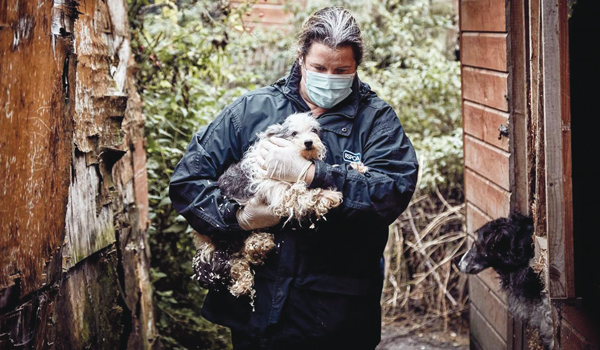RSPCA considers handing over prosecution responsibilities to the CPS
The RSPCA says it is “exploring the transfer” of its animal welfare prosecuting role to the Crown Prosecution Service (CPS) to focus on its frontline work investigating cruelty.
The charity says tougher sentences for animal abusers that are expected to come into force in England and Wales this year will place “a big responsibility” on its prosecution service.
Alongside this, the RSPCA says some case are becoming increasingly complex with the involvement of “hardened criminal gangs” in crimes linked to puppy farming.
Those inflicting cruelty and suffering on animals face potentially longer jail terms of up to five years under the new prosecution guidelines.
The RSPCA says currently just one of more than 100,000 reports of cruelty and neglect it receive each year end up in the courts. The vast majority of cases are dealt with through advice, education and support.
RSPCA chief executive Chris Sherwood said: “We’re pleased that this year could see one of our hard-fought campaigns to raise the maximum penalty for animal abuse from six months to five years become reality, but this also means a big change in the way cases are prosecuted and sentenced.
“Some of these cases will now move to the Crown Court and those carrying out the worst abuse could face lengthy jail terms.
“This places a huge responsibility on a charity’s shoulders. We believe this responsibility should sit with the CPS, which is a statutory public body with regulatory oversight.”
However, any changes regarding prosecution referrals to the CPS would require government approval.
The proposal was one of eight key priorities in the RSPCA’s new ten-year strategy unveiled this week.
Mr Sherwood stressed that it would not be “stepping back from prosecutions”, only from its role as the prosecutor.
“We’re proud of our history bringing animal abusers to justice and for many years we’ve been the right people to do this vital work. However, the world has changed and we have to change with it,” he said.
“Alongside this, we’re seeing trends with cases with hardened criminal gangs involved in puppy farming, dog fighting, cockfighting or hare coursing, sometimes with millions of pounds changing hands.
“We’re an animal charity and our concern is welfare but these complex cases can involve serious offences such as fraud or weapons. We’ve already seen puppy farming reports to us increase five-fold in a decade and with the increasing demand for puppies during lockdown we believe more of these complex cases will come our way.”
Mr Sherwood added: “Our inspectors would still be rescuing, investigating and collecting evidence of cruelty and abuse and seeking to hand this over to the CPS. We believe that there may be a better way to ensure animals get the justice they deserve by bringing together our expertise in investigations with the CPS’s skills and resources.”
Mr Sherwood said this would free-up resources to focus on its “unique frontline investigation, rescue and care work”, where it can make the most difference to animals.
However, he said the RSPCA would “reserve the right to take a prosecution in future” if it felt that justice was not being done for animals.
The RSPCA is also seeking statutory powers under the Animal Welfare Act 2006 for its frontline animal rescuers as part of the new strategy.
“This means that they would be able to reach animals in need more quickly, allowing them to access private land and outbuildings, although crucially not homes, if there was a reasonable expectation that an animal was suffering. It would also reduce pressure on the police at a time when their resources are stretched,” said the RSPCA.
These changes would bring England and Wales in line with Scotland and Ireland where the Society for Prevention of Cruelty to Animals charities have statutory powers and pass their cases to the state prosecutor.
Mr Sherwood said: “We want statutory powers to help our inspectors do more to help animals and, with these increased powers, it makes sense that we separate out these functions. We know this system has worked successfully for decades in Scotland. Under this proposed model, we would continue to have a key role in making sure animal abusers don’t go unpunished, investigating complaints of cruelty and abuse and would pass our evidence to the CPS for the long-term work of prosecuting those responsible.”
René Olivieri, chair of the RSPCA’s board of trustees, said it “was the right time to review this role as we look at where we want to be by 2030”.


